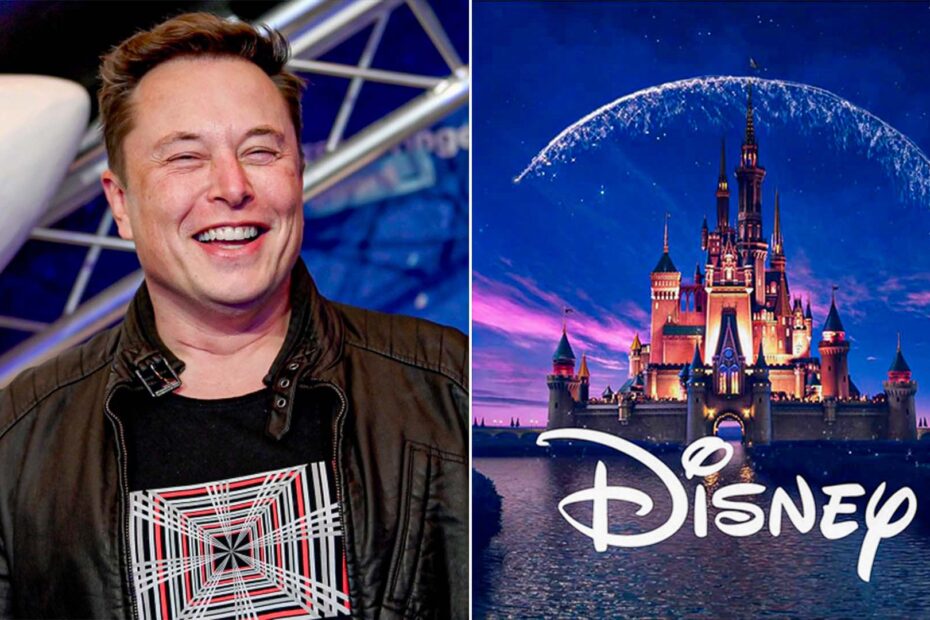The ever-entrepreneurial Elon Musk, known for his ambitious ventures in electric vehicles, space exploration, and underground transportation, dropped a bombshell during a recent press conference. Surrounded by a crowd of eager reporters and bewildered onlookers, Musk casually hinted at a potential acquisition that could reshape the entertainment industry as we know it: buying Disney.
With a mischievous twinkle in his eye and a trademark smirk playing at the corner of his lips, Musk coyly remarked, “I’ve been thinking about buying a little something to add to my collection of toys. And what’s more fitting than the House of Mouse?”
For decades, Disney has been synonymous with magic, creativity, and childhood wonder. From timeless animated classics like “The Lion King” and “Beauty and the Beast” to blockbuster franchises such as Marvel and Star Wars, the entertainment conglomerate has captured the hearts and imaginations of millions around the globe. But could it soon fall under the eccentric stewardship of Elon Musk?
The possibility seems both absurd and tantalizing in equal measure. Musk, after all, is no stranger to audacious gambits and grandiose visions. His track record includes founding SpaceX, revolutionizing the electric car industry with Tesla, and even dabbling in the realm of neural interfaces with Neuralink. But Disney?
As news of Musk’s hint spread like wildfire across social media, memes began proliferating at an alarming rate. Pictures of Mickey Mouse wearing a spacesuit, Iron Man wielding a lightsaber, and Buzz Lightyear piloting a Tesla Roadster flooded Twitter feeds and Instagram timelines. Some dismissed the notion as nothing more than a publicity stunt, while others couldn’t help but entertain the possibility of such a seismic shift in the entertainment landscape.
In the halls of Disney’s corporate headquarters in Burbank, California, executives scrambled to make sense of the situation. CEO Bob Chapek convened an emergency meeting of the board, where speculation ran rampant and conspiracy theories abounded. Could Musk’s interest in Disney be genuine, or was it merely a ploy to drive up stock prices and steal the spotlight from competitors?
Meanwhile, in the inner sanctum of Musk’s sprawling mansion in Bel Air, the enigmatic billionaire reveled in the chaos he had unleashed. Surrounded by a cadre of loyal advisors and engineers, he pored over financial reports, market analyses, and feasibility studies with the intensity of a mad scientist plotting his next experiment. To Musk, the prospect of acquiring Disney wasn’t just a business opportunity—it was a chance to reshape the future of entertainment in his own image.
But as the days turned into weeks and the frenzy showed no signs of abating, Musk remained characteristically tight-lipped about his intentions. When pressed for details by intrepid journalists and curious investors, he offered nothing more than cryptic hints and playful banter. “I’ve always been a fan of animated movies and theme parks,” he quipped during a Twitter AMA. “Who knows what the future holds?”
Speculation reached a fever pitch as analysts debated the potential implications of a Musk-owned Disney. Would he transform Disneyland into a futuristic utopia with self-driving roller coasters and robotic princesses? Would he greenlight a slew of space-themed Marvel movies set on distant planets and starships? And perhaps most importantly, would he replace Mickey Mouse with a cybernetic rodent named Muskrat?
As the rumor mill churned and conspiracy theories multiplied, one thing became abundantly clear: Elon Musk had once again succeeded in capturing the world’s attention and pushing the boundaries of what was thought possible. Whether his hinted acquisition of Disney would materialize into reality remained to be seen, but one thing was for certain: the future of entertainment had never looked more uncertain or exhilarating.
In the end, Musk’s flirtation with Disney proved to be just that: a flirtation. Despite weeks of frenzied speculation and wild conjecture, no formal bid was ever made, and the House of Mouse remained firmly in the hands of its current owners. But the mere suggestion of such a seismic shift in the entertainment landscape served as a stark reminder of Musk’s unrivaled ability to capture the public’s imagination and defy expectations at every turn.
As the dust settled and life returned to normal, albeit with a slightly heightened sense of anticipation and wonder, one couldn’t help but wonder what other surprises Elon Musk had up his sleeve. After all, in a world where anything seemed possible, the only limit was the boundless expanse of the human imagination. And with Elon Musk at the helm, that expanse seemed more limitless than ever before.
In the aftermath of the Musk-Disney speculation frenzy, the world braced itself for the next chapter in the saga of Elon Musk’s audacious adventures. While the tantalizing prospect of a Musk-owned Disney had ultimately fizzled out, the buzz surrounding the enigmatic billionaire showed no signs of abating. If anything, it only served to fuel the flames of curiosity and anticipation as people around the globe wondered what grandiose scheme he would concoct next.
